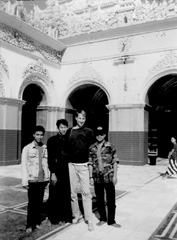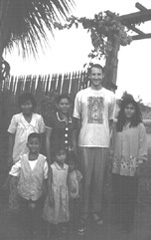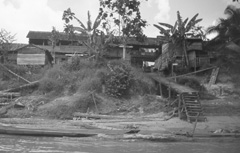
So how do you do it? This is the age-old question that foreigners anywhere want to resolve. We all travel to exotic and distant places to feel like weíre away from it all, but are confronted with language barriers, differences in social customs, self-consciousness, travel lassitude, lack of time or what have you, that all combine in one way or another to make it easier said than done. What I want you to come away with after reading this guide is knowing that it doesnít have to be this way. Veteran travelers who are successful at befriending locals will all agree on one main fact that is key to the issue at steak here: all over the world, people are the same.
Sound obvious? Allow me to clarify. All over the world, children play games. All over the world, men drink and talk about women. All over the world, family discussion centers around the dinner hour, religion is highly regarded, money talks, people need friendship and love, students and teachers are respected, personal appearance is closely scrutinized, there exist assholes, smiles are good, safety and health are important, and foreigners are viewed with curiosity. Look around you today. All of these things are basic elements of human society, and are understood by everyone. Consequently, as a foreigner in a strange land, all you need to do is follow the Golden Rule: smile, be friendly to others and donít be an asshole. Good personal relationships will come.
Perhaps it sounds too easy, since this doesnít always work at home. The fact is, however, that most people in developing countries do not lead the individualistic, goal-oriented, self-centered lives that we have in the West. Family, interpersonal and community relationships are still very important, believe it or not. People are born and raised, live and often die all in the same village. Transient societies with mass, rapid communication and transport havenít developed yet. Citizens of the third world who make it to the West report that making friends here is difficult. A common frustration is that nobody on the street here wants to talk to you.
Beyond the Golden Rule, of course, there is no guaranteed way to meet local people, nor is there any single place to hang out where your chances are better. Some of the best friends I made on my trip I met at universities, on buses, trains and boats, at roadside food stalls, at temples, on park benches, on the beach, at the guest house, or simply walking down the street. Anywhere that a lot of local people congregate and sit around is a good place. Say hello in their language and smile. As a foreigner, you will attract more attention than a normal person, so you can use this to your advantage. People who speak a little English or French will try to talk to you. Be curious and ask them about their lives as much as they ask you, but donít be pesky. Try to stay on equal footing by not flaunting yourself too much. A common one youíll get is "Oh, American! USA number one! America very good!" Counter this by saying their country is very nice too, and that your own country is not perfect. Do not talk about money. Itís already understood that youíre rich, just by being there, so you donít need to make things any worse.
With this basic scenario, even the simplest conversations will lead to invitations, either to lunch, as a guide for the day, or to a home. This is the ultimate goal of befriending others. When I meet someone I like on the road, the main thing on my mind is, "Please invite me to stay with you!" No matter how much youíve read, it is in a family home that you will learn the most about the foods, social customs, languages and ritual lives of the peoples you meet. Cherish these opportunities.
Once in a home, there are some simple, universal rules that need to be followed. Number one is, do as others do. If everyone takes off their sandals, take yours off too. If nobody talks during dinner, donít talk (except to say that the food is good -- food is so important in some places that talking during a meal is considered an insult that distracts from the task at hand). If others eat with their hands, do the same (if youíre offered a spoon, itís up to you). If others are bathing and you are invited to bathe, bathe (even if youíve already bathed that morning Ė in tropical climates, donít be surprised if you see rural people bathing 3-4 times per day). If everyoneís taking a nap, feel free to do the same.
Rule number two is, do not whine and complain about the taste of food or the lack of amenities. Generally, as an invited guest, you will be given the most hospitable, royal treatment possible, so negatives will probably not be an issue. The basic idea here is to be as little of a pain in the butt as possible, so that your host will like you. Often you may be the only close contact that villagers will ever have with foreigners, so consider yourself to be a cultural ambassador of sorts. You have the important responsibility of helping people believe that foreigners are genuinely nice people to be around.
Rule number three is, always thank your hosts for everything they do for you. Learn how to say this in their language. This lets your host know that you havenít forgotten that they are doing kind things for you.

Good friends in Burma.
Unfortunately, one big problem is that a lot of places in South and SE Asia have been spoiled (or are being spoiled) by the presence of foreigners who donít care Ė i.e. the quick-dip package tourist. These people donít have time to stay in homes and tread gently. Locals have learned that tourists shell out money by the bushel, so they become less interested in just being your friend. Itís harder to meet people in these places. Consequently, the less touristy, the poorer and the less developed a country is, the greater the opportunities that exist to meet people. Most of West Africa, Bangladesh, Burma, Cambodia, and other "remote" regions fit the bill. The cat is out of the bag. Go there and experience before globalization is complete. Despite what you may have heard or what your general impression of life overseas is, it will not be long before Colonel Sanders and Ronald McDonald have touched the furthest corners of the globe. This is a major advantage which present-day, long-term travelers should use to their advantage. You have the opportunity to get to know a foreign land on an intimate level.

Malaysia has already done it...

... Cambodia is experimenting with it...

... and soon Nepal will too.
Now that you know the secrets to befriending locals, itís instructive to point out some important details. In Burma, the military government discourages/"prohibits" its citizens from interacting with foreigners too closely. Consequently, if you think youíre not getting invited into homes because you smell bad, think again. Do not prod citizens in Burma (or anywhere, for that matter) to take you in. There are plenty of nice people there, and theyíll invite you in if they feel itís ok. You have no basis to judge your personal situation in Burma. As a foreigner, everything is laid out for you in a facade, from authorized guest houses, to authorized transport, to authorized regions, to authorized currency. Behind the scenes, you may be risking the safety of Burmese citizens by getting too close. Especially do not talk with them about political matters. Let them make all the moves. Your political efforts, no matter how well intentioned, are much better spent abroad in the international arena than in Burma. Use your time there to get to know the people.
Cambodia is another sticky thorn, although tensions are easing. Freedom of expression is not well practiced. The political opposition in Cambodia is frequently silenced by imprisonment and intimidation. A coup staged by Prime Minister Hun Sen in 1997 disrupted the fragile balance which was struck by UN sponsored elections in 1993. Donít let this political stuff put you off, though. In general it is much easier to stay with locals in Cambodia than in Burma. But you have been warned...
While staying with a Vietnamese man in Stung Treng I was approached and followed by the police several times. They told my friend that I was forbidden to stay with him, or all local people for that matter, and that I should leave immediately for the nearest guest house. They told me they feared for my safety and comfort. This was a reasonable concern, I suppose, given that most rural Asians believe foreigners to be quite fragile creatures who require lots of TLC, but my friend and I stood ground by explaining that I was very poor. Besides, I was having a good time, why should I leave? I knew there was no such cohabitation law, as they had claimed.
I ended up staying in the region for a couple weeks, and was harassed by the police no fewer than five times. By harassment I mean rude interrogation out of the blue, in no particular place at no particular time. They were being jerks, and I told them so (in English, at the top of my voice!) In retrospect I attribute their great curiosity in me to my ill-fated attempt to bribe my way into Laos, the fact that one of the police officers owned the guest house, the fact that my friend was Vietnamese (there is strong historical hatred between the Khmer and Vietnamese), the fact that I spoke some Khmer, and, of course, the fact that they were looking to make a few extra bucks in baksheesh. The moral of this little tale is, if you know you are in the right, stand your ground, and donít let corrupt government officials take advantage of you.

My home away from home in Cambodia.
In Malaysia, the kindness and hospitality of the inland Dayak tribes of Sarawak are legendary. In the past the rule has been that anyone taking a serious trip there had to stay in a Dayak longhouse, and this rule is still generally true, but itís fast fading. A longhouse is a unique style of communal living by which the citizens of a village erect a very long house (up to 100+m long) which is partitioned into smaller quarters for individual families. Traditionally these structures were built out of durable, local hardwoods, but today they can be of modern construction. A long, shaded porch in front serves as a shared meeting place where everybody hangs out.
The problem today is that Sarawak is swamped with tourists (foreign and Malaysian), and Malaysiaís booming economy has helped the Dayak get rich. Many Dayak "tribesmen" have satellite dishes, VCRs and mobile phones. A number of established tour companies in Kuching offer trips to upriver longhouses. Needless to say, these are touristy affairs. So how to avoid all this? The Dayak are still friendly people, so you need to employ the strategies outlined above to meet them on your own. It is not advised, as anywhere in world, no matter how hospitable the people, to just show up at a longhouse and expect to be met with open arms. A lot of foreigners have done this, especially along the Rajang River, thinking they can pay their way in with whisky and cigarettes, and the Dayak are sick of it.

The Dayak longhouse (Sarawak, Malaysia).
This brings me to a rather important point about bunking with and accepting the hospitality of locals. You should always do it because you are interested in them, and they are interested in you, i.e. as friends. DO NOT bring stupid gifts like liquor, cigarettes, candies, pens or Pokemon cards to "pay" for your visit. Do you pay your friends back home when you stay with them? Do they expect you to? The whole idea here again is to increase cross-cultural understanding and friendship. If you bribe your way into a homestay, youíre viewed more as a sack of money than as a friend. This spoils it not only for you and them, but for everyone who comes along afterwards as well. The last thing we need is a circuit of overeager, profit-driven entrepreneurial locals offering stays with "traditional" families. I do believe, however, that itís ok to offer a small amount of money or food after your stay as a token of appreciation and friendship, but in no way should you feel obligated to, and in no way should you specify ahead of time that you may do this.